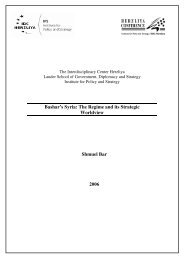Iran: Cultural Values, Self images and Negotiation Behavior
Iran: Cultural Values, Self images and Negotiation Behavior
Iran: Cultural Values, Self images and Negotiation Behavior
You also want an ePaper? Increase the reach of your titles
YUMPU automatically turns print PDFs into web optimized ePapers that Google loves.
<strong>Iran</strong>: <strong>Cultural</strong> <strong>Values</strong>, <strong>Self</strong>-<strong>images</strong> <strong>and</strong> Negotiating <strong>Behavior</strong>The <strong>Iran</strong>ian concept of honor, however, differs from its Japanese or even Arabequivalent. The other side of gheyirat is aaberou (face saving). The mechanisms forsaving face in <strong>Iran</strong>ian inter-personal discourse usually preclude extreme situations. 125Loss of face due to an affront to an <strong>Iran</strong>ian's gheyirat usually does not call for extremereactions such as suicide or murder. For the most part, it is alleviated verbally <strong>and</strong>does not preclude continued contact between the affronter <strong>and</strong> the affronted.DissimulationFrankness <strong>and</strong> complete c<strong>and</strong>or in discourse between Persian speakers is notpolitically correct. Brashness <strong>and</strong> audacity (por-rou–yi, roughly translatable ashutzpah) are usually frowned upon in <strong>Iran</strong>ian society. <strong>Iran</strong>ian social mores do not seethe advantage of putting everything on the table. This has been interpreted as a spinoffof two cultural traits: the <strong>Iran</strong>ian concept of distinction between the inner world ofa person <strong>and</strong> the dangerous outside, according to which externalization of one's realthoughts is risky <strong>and</strong> one should always be on guard; <strong>and</strong> basic <strong>Iran</strong>ian politeness,which is not commensurate with brashness.This is not to say that sincerity is not valued or that an <strong>Iran</strong>ian does not feel theneed to convince his counterpart of his genuineness. It is transmitted, however,through extra-linguistic devices <strong>and</strong> oaths. 126 The projection of sincerity through theseartifices is not an act that is performed lightly; it is usually employed when it is clearthat the other side doubts the sincerity of his <strong>Iran</strong>ian interlocutor.In <strong>Iran</strong>ian political culture, dissimulation towards the outside is to the credit of apolitical leader. Cleverness <strong>and</strong> manipulative abilities are highly respected in leaders –both <strong>Iran</strong>ian <strong>and</strong> foreign. This is quite different to the East Asian paradigm in whichblatant deception may deliver a fatal blow to the trust necessary for furtherinteraction. Numerous accounts tell of senior <strong>Iran</strong>ian officials who pass on a messagethrough reliable channels (which states are normally careful not to taint withdisinformation). The message may be intended to raise hopes for a shift in <strong>Iran</strong>ianpolicy if external pressure is not put on them, or to tempt someone away from supportof opposition activity. 127 After the goal has been achieved, in all these cases thepeople involved have concluded that the messages were psychological warfare. 128When such dissimulation is exposed (for example by Voice of America, Voice ofIsrael, BBC in Persian, or by the <strong>Iran</strong>ian opposition), it does not give rise to questionsregarding the politician's domestic credibility or harm his own st<strong>and</strong>ing.125 Arasteh 44.126 Physical gestures for stressing sincerity include the afore-mentioned touching one's heart with theopen h<strong>and</strong>. Persian is rich in oaths, including “by my family,” “by my eldest son,” “by the prophet (orAli)”, “by all the prophets,” “by my life,” “may my h<strong>and</strong>s be cut off.” There are also bogus oaths thatare especially meant for lying, such as "hazrat-e Abbas" (on the name of a non-existent Prophet).127 In the mid-1990s <strong>Iran</strong> arrested an aged <strong>and</strong> senior member of the Jewish community, charged himwith espionage <strong>and</strong> sentenced him to death. His family began to mobilize international public opinionto save him. At one point, the <strong>Iran</strong>ian MOIS negotiated an elaborate deal with him that was contingenton preventing any public discussion of the issue, ostensibly in order to prevent radical pressures. Theconvicted man was allowed to speak with his relatives abroad <strong>and</strong> to inform them of the deal <strong>and</strong> askthem to refrain from any public activity that could scuttle the deal. They agreed; a few hours later (as itturned out), he was duly executed.128 The Persian adage states “a lie which brings benefit is preferable to a truth which causes damage.”34
















